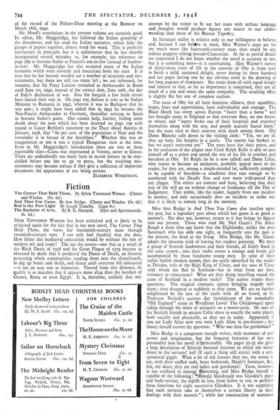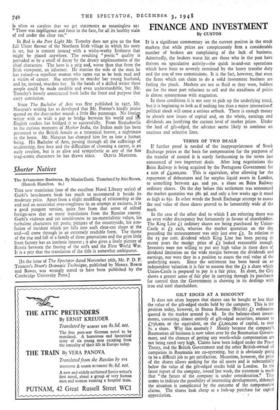Fiction
The Bachelor of Arts. By R. K. Narayan. (Eyre and Spottiswoode. 8s. 6d.) Miss TOWNSEND WARNER has been criticised and is likely to be criticised again for the fact that in her new novel, The Corner That Held Them, she views her fourteenth-century nuns through twentieth-century eyes. I can only feel thankful that she does. How bitter this mediaeval concoction would be without the jam of modern wit and irony! The age she covers—one that as a result of the Black Death of 1358 and the Great Plague of 1374 became so obsessed by death that it produced the Dance of Death, an hysteria possessing whole communities, sending them into the churchyards, to dig up bones and skulls, and dance until everyone fell exhausted —is not an easy one to humanise. Viewed from this distance, its quality is so macabre that it appears more alien than the heydays of Greece, Rome or even Egypt. It is, therefore, unlikely that any
attempt by the writer to fit out her nuns with archaic language and thoughts would produce figures any nearer to our under- standing than those of the Bayeux Tapestry.
In literature reality is relative only to our willingness to believe, and, because I can belk in them, Miss Warner's nuns are for me much more like fourteenth-century nuns than could be any tedious puppets talking pseudo-Chaucerian. As far as period details are concerned I do not know whether the novel is accurate or not, but it is something more—it is entertaining. Miss Warner's survey of thirty-three years of life in the convent of Oby is from start to finish a mild, sustained delight, never during its three hundred and ten pages jarring one by any obvious error in the drawing of her long pageant of characters. She treats them all with equal insight and interest so that, as far as importance is concerned, they are all much of a size and rouse the same sympathy. The resulting effect is slightly flat but one of complete realism.
The nuns of Oby for all their feminine, silliness, their squabbles, hopes, fears and superstitions, have individuality and courage. The Black Death has swept across Europe _" faster than a horse" and has brought panic to England so that everyone flees, no one knows to where, and "lepers broke out of their hospitals and crutched themselves along with the zest, and people scarcely feared them," but the nuns stick to their convent with death among them. Old Dame Blanche calls down to the visiting clerk: "Yes, we are all shut up here, like knights in a castle. The enemy has broken in, but we aren't overcome yet." The nuns have lost their priest, and in the confusion of the -plague year Clerk Ralph Kello is able to pass himself off as a priest and spend the rest of his life in comfort and boredom at Oby. Sir Ralph (as he is now called) and Dame Lilias, who yearns to become an auchoress, probably appeal most to the reader, for they are, among a simple-minded lot, sufficiently complex to be capable of boredom—a condition then rare enough to be numbered with the Deadly Sins and now more widespread than any plague. The others are content and busy, believing that their way of life will go on without change or hindrance till the Day of Judgement. They amble, like the reader, happily from one incident to another, and only occasionally does an incident so strike one that it is likely to remain long in the memory.
Miss Ann Bridge in And Then You Came also touches upon the past, but a legendary past about which her guess is as good as anyone's. She does not, however, return to it but brings its figures into our present. Those Who read Mr. Neil Gunn's The Silver Bough a short time ago know that the Highlander, unlike the poor Sassenach who has only one sight, as frequently sees the past as the present, the dead as the living. Miss Bridge, like Mr. Gunn, adopts the tiresome trick of leaving her readers guessing. We meet a group of Scottish landowners and their friends, all firmly fixed in the caste system ; into their midst comes a strange and lovely girl accompanied by three handsome young men. In spite of their rather foolish modem narnesi they are easily identified by the reader as Deirdre, wife of the-High King of Ulster, and the sons of Uisne with whom she fled io Scotland—but in what form are they, visionary or reincarnate? What are they doing travelling round the coast of Scotland in a modem yacht? The author evades these questions. The magical creatures appear bringing tragedy with them then disappear as suddenly ai they came. We are no further enlightened by the losi of the yacht with all on board, or by Professor Porlock's curious day (reminiscent of the remarkable "Old England" scene in Wyndham Lewis' The Childgrmass) spent riding through the mists of antiquity on a motor-cycle. He sees all his Scottish friends in ancient Celtic dress in exactly the same places, both socially and physically, as they are in today. Apparently if you are Lady Mine now you were Lady Aline in pre-history ; this theory should answer the question: "Who was then the gentleman?"
• Miss Bridge is a competent enough writer, with moments of real power and imagination, but the frequent intrusion of her own personality into her novel is inexcusable. On pages 33-35 she gives a long description of Seottish baronial interiors in which she writes down to the servants' hall (if such a thing still exists) with a con- spiratorial giggle. What a lot of old funnies they are, she seems to say, with their stuffed seals, brass bedsteads, Maple's furniture, &c., but, my dears, they are real ladies and gentlemen! Taste, however, is not confined to interior decorating, and Miss Bridge herself is capable of the following : ":Ronald Macdonald was Glasdeir's piper and body-servant, the eighth in line, from father to son, to perform these functions for eight successive Glasdeirs. It is not surprising that such servants take to themselves a certain liberty in their dealings with their masters " ; while her construction of sentences Is often so careless that we get statements as meaningless as " There was intelligence and force in the face, for all its healthy stain of red under the clear tan."
In Red is the Port Light Mr. Tomelty does not give us the fine full Ulster flavour of the Northern Irish village in which his story is set, but is content instead with a wishy-washy Irislmess that might be placed anywhere. The resulting " poetic " quality is pervaded as by a smell of decay by the dreary unpleasantness of the chief characters. The hero is a prig and, worse than that from the Irish viewpoint, an informer. He marries the wife of the man he has ruined—a repellent woman who turns out to be both mad and a victim of cancer. She attempts to murder her young husband, and he, instead, murders her. In the hands of a skilled writer these people could be made credible and even understandable, but Mr. Tomelty's loosely constructed book lacks the force and purpose that carry conviction.
Since The Bachelor of Arts was first published in 1937, Mr. Narayan's writing has so developed that Mr. Forster's kindly praise ,quoted on the dust-jacket sounds a little like patronage. No foreign writer with so wide a gap to bridge between his world and h1S English readers has bridged it so successfully. From Sirajudowlla to the curious monsters of Mother India, the Indian male has been presented to the British female as a tyrannical horror, a nightmare in the home. Mr. Narayan has changed him for us into a human being. His Bachelor of Arts, passing through all the sufferings of studentship, first love and the difficulties of choosing a career, is an early creation, but is as alive and sympathetic as any of the fine tragi-comic characters he has drawn since. OLIVIA MANNING.



































 Previous page
Previous page